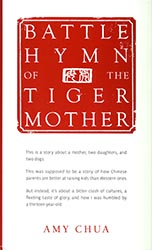Tiger Mom or Pussycat Mom?
By Practical Homeschooling Staff
Printed in Practical Homeschooling #97, 2011.
 In this review of Amy Chua's book, find out how she recommends we teach our children to get excellent results.
In this review of Amy Chua's book, find out how she recommends we teach our children to get excellent results.

|
by Practical Homeschooling Staff

 “A
“Alot of people wonder how
Chinese parents raise such stereotypically successful kids. They wonder what these parents do
to produce so many math whizzes and music prodigies, what it’s like inside the family, and
whether they could do it too. Well, I can tell them, because I’ve done it. Here are some things
my daughters, Sophia and Louisa, were never allowed to do:
- attend a sleepover
- have a playdate
- be in a school play
- complain about not being in a school play
- watch TV or play computer games
- choose their own extracurricular activities
- get any grade less than an A
- not be the #1 student in every subject except gym and drama
- play any instrument other than the piano or violin
- not play the piano or violin”
Thus begins Amy Chua’s bestselling phenomenon, Battle Hymn of the Tiger Mother.
It’s safe to say Ms. Chua isn’t afraid of controversy, as she fearlessly takes on some of America’s
most cherished educational idols: self-esteem, individual “specialness” based on just existing,
“trying” being as good as “succeeding,” and even that universal bane of so many childhoods, the
school play.
A pre-launch article provocatively entitled “Why Chinese Mothers Are Superior” was viewed over 1 million
times and (as of today) has over 350,000 “likes” on Facebook.
Her timing couldn’t have been better. The results of the latest international Programme for International
Student Assessment (PISA) tests had just been announced, and Shanghai, China, rousted all comers in math, science, and
reading. Even previously unbeatable Singapore! Was this our “educational Sputnik” moment? Had East beat
West? Did the Chinese have the answer?
To be fair, Amy Chua isn’t 100% Chinese in her outlook. She grew up in the Midwest and married a Jewish
American. Brought up attending American schools and required to follow Chinese rules at home (no speaking English, no
sleepovers, no second places in anything), she has also traveled extensively overseas. So she had a wide range of
thoughtful educational choices to draw upon.
Nonetheless, when the daughter became the mother, Ms. Chua decided to combine her career as a Yale law professor with
a terrifyingly intense (to Americans) program of extracurricular training for her girls. Especially in the area of
music, about which most of the book revolves. (The required A’s in school are practically incidental to the huge
amount of effort, sacrifice, and money spent on the girls’ musical training.)
All was not easy in Tigerland. While Daughter #1, Sophia, was naturally compliant and respectful, Daughter #2, Louisa,
was naturally inclined to fight her mom every step of the way. With the weapons of yelling, threatening to take away or
destroy cherished items, and other slightly scary means, mom Amy got her way. Both emerged as top young musicians,
though Louisa finally managed to impose her own preference and put her major efforts outside school into tennis. At
which she turned out to be . . . surprise! . . . highly driven to succeed. Wonder where she picked that up?
Amy Chua is an amazingly honest and talented writer: much of the book’s appeal comes from its wry humor. Still,
the shock value of a mom who thinks it’s OK to compare kids and to scold them when they don’t do their
best—after
already practicing an instrument for hours on end—is admittedly high.
This book is a full frontal attack on the self-esteem movement, on the idea that parents owe kids everything and kids
owe parents nothing, and on the idea that parents should “butt out” and let kids choose their own activities
and social life. Love her or hate her, Amy Chua gives the reader plenty to think about.
Mainly, Battle Hymn of the Tiger Mother is about America’s educational decline, and one mom who is willing to do
whatever it takes so this doesn’t happen to her kids. With that, we can all agree.